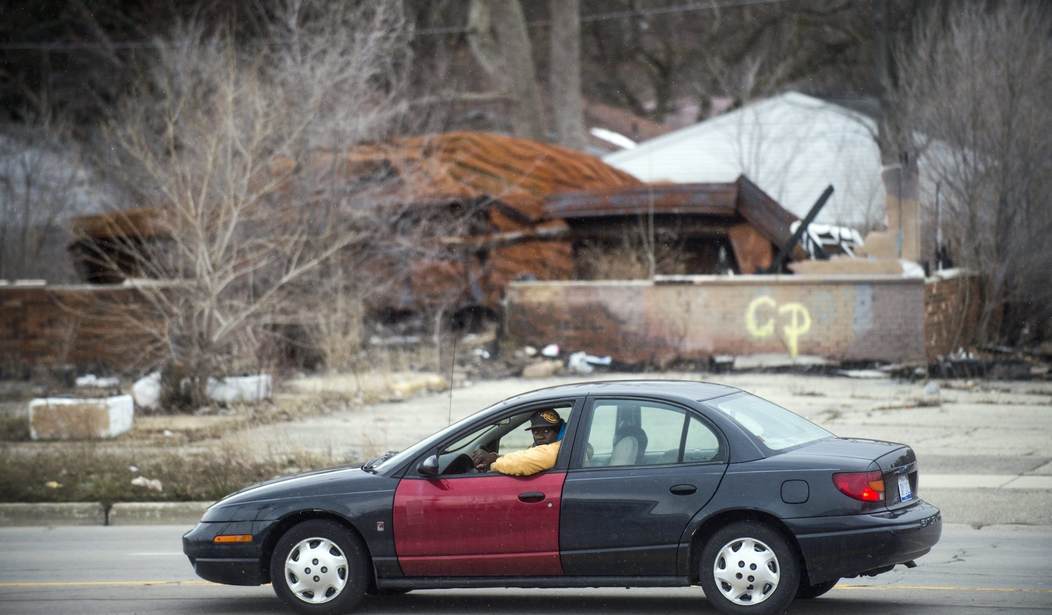In the 2016 campaign, Democrats decided Flint, Michigan, was going to be the centerpiece evidence of uncaring Republicanism. To Michigan residents, it seemed an odd choice. Even in Flint’s surrounding suburbs, blaming anyone but Flint for Flint’s problems fell on deaf ears.
But this crisis seemed too good to go to waste. So Bernie and Hillary trooped over and joined the chorus that Republicans had poisoned Flint. It was a little like blaming the chaos in Somalia on the U.S. troops who came to feed people.
Flint’s descent into anarchy was decades in the making. Leadership in the city and county was made up of a toxic combination of union and ethnic politics that drove away business and hindered law enforcement. Local Democrats were in charge every step of the way — except when governors, both Republican and Democrat, sent financial managers to restore some fiscal guidelines to prevent total collapse.
The Netflix documentary Flint Town chronicles the results. It is not primarily a political history, but an incredibly candid look at trying to bring law and order to a city where the last shred of trust in institutions has broken down, and the police force is woefully undermanned.
The focus is on an old-school cop, Tim “Two Guns” Johnson, brought out of retirement to try to stem the tide in a city where the bad guys knew they had little to fear from a police force overwhelmed by numbers.
In the late 1980s, when Flint had nearly three times the sworn officers they have now, I used to do third-shift ride-alongs with a patrol officer buddy of mine. One night, several people called in sick and the shift was extremely short-handed — only two officers showed up.
One was Tim Johnson.
The plan was to show a lot of presence, so the bad guys wouldn’t know. At the time, I didn’t know Tim Johnson, but I remember his name, because I heard it on the radio. All night long.
My buddy would occasionally chuckle and say: “There goes Supercop.”
Flint Town viewers meet Johnson as he becomes Flint’s new chief of police. By the time of his appointment, his department is as short-handed as that one-third shift patrol was 30 years ago.
But now, the bad guys know it. Everyone knows it.
As Flint Town opens, we meet Officer Bridgette Balasko, as she responds to days-old 911 calls. Victims complain as much about the FPD as they do the person who broke into their house. Balasko tells us she came to Flint for the action, figuring it’s a fast track to a federal job because of all the experience she will get.
She’s working third-shift patrol. Responding to calls for help. Alone.
Johnson decides he has to put criminals on notice. He forms a special unit called the CATT Squad (Crime Area Target Team), a hand-picked group of aggressive officers designed to make the criminals uncomfortable for a change.
It’s a fairly desperate strategy, but it works — for a while. Yet Johnson knows he needs more than a show of force; he needs a bigger force. He gets approval for a few more recruits from the police academy, and even tries training and deputizing armed civilian volunteers. But hanging over all of them is the specter of a police millage that needs to be passed to prevent total collapse, police officers getting even more burned out by the pace, and the bad guys starting to realize that they still have the numbers advantage.
Desperate for revenue, Johnson even decides to sell confiscated guns at auction, rather than make the politically correct gesture of destroying them that most cities make.
Recruiting isn’t easy, even in a city where jobs are scarce. One of the promising young academy members, Dion Reed (who is astoundingly in the class with his 40-something mother), is candid about his black friends who despise his choice.
Here is where Flint Town is amazingly frank.
Police officers, black and white, recruits, and civilians talk to the camera without reservation about racial tensions. Black cops talk about their community being suspicious — or worse — of them. They shake their heads that their white colleagues are receptive to Donald Trump. White cops talk about the tension of working a majority black city at the time of riots and Black Lives Matter.
Cameras are there in the briefing room as national news breaks about police shootings, and ambushes of police officers. We see both the unity of everyone being part of the (very) thin blue line, but also the differences in the reaction to various national events.
Part-time Flint pastor and full-time cop Brian Willingham puts it best: “The people who secure the city are less secure than they’ve ever been.”
Flint Town gives two quick peeks at the sheer lunacy that is the Flint City Council: The idiocy of the debate when new Mayor Karen Weaver replaces the nice, politically connected police chief with the hard-charging Johnson; and Weaver and Johnson confronting the council over making no budget upgrades for the department after the millage actually passes.
Johnson blows up when a councilman protests that at least they haven’t made cuts: “I always wondered why this city was in the position it was and now I see why, it’s at the top!”
It’s impossible to watch these clowns and think Flint’s problems are mostly from the outside.
Flint Town is a real-life companion piece to The Wire. It’s unflinching and apolitical, and required viewing for anyone who wants to talk about the problems of inner-city America.









Join the conversation as a VIP Member